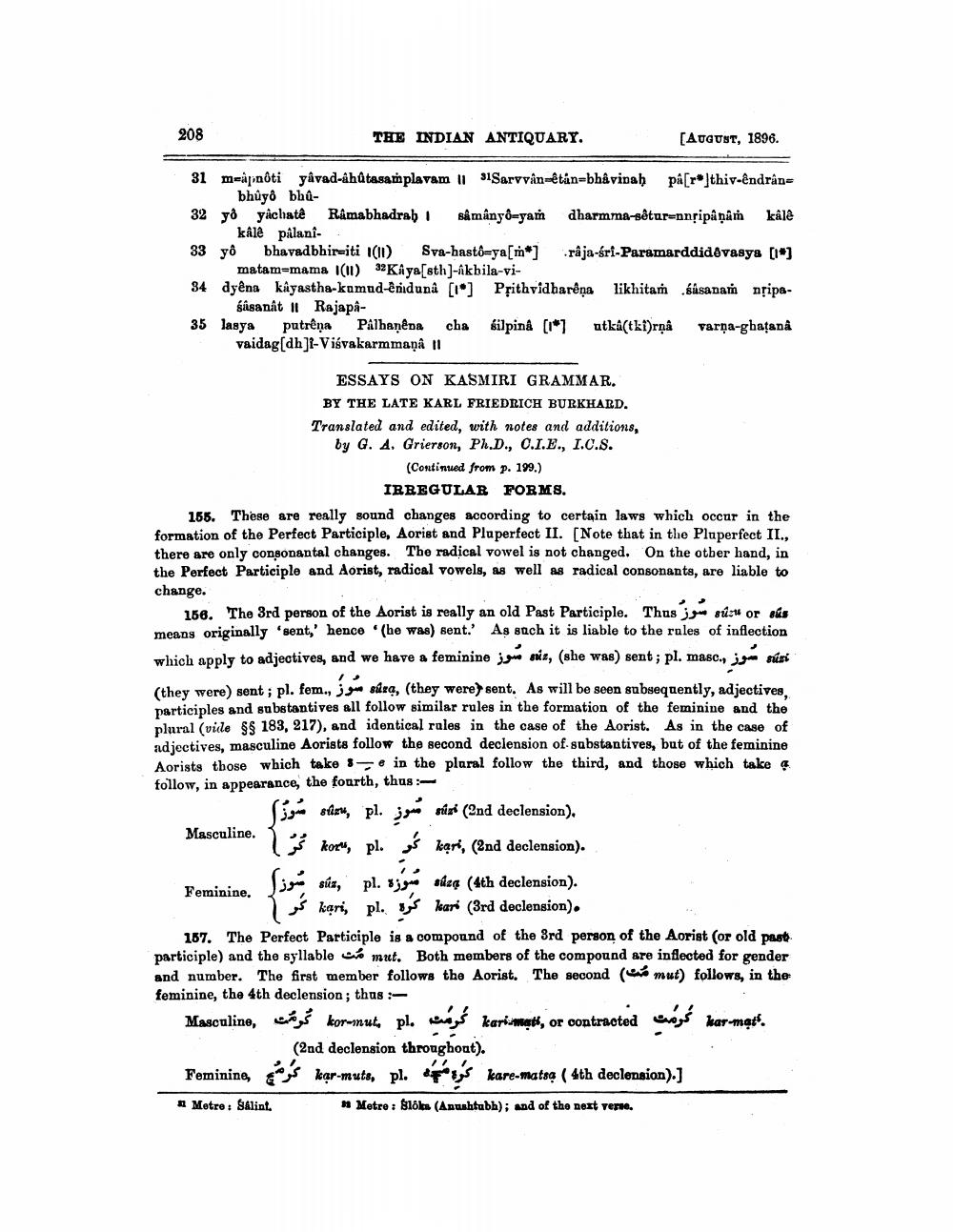________________
208
THE INDIAN ANTIQUARY.
[AUGUST, 1896.
31 meåpnoti yâvad-lhůtasamplavam 11 31Sarvvân-êtán=bhavinah på[r*]thiv-êndrân=
bhugo bhû32 yo yâchate Ramabhadrah | så manyô=ya dharmma-sêturennripaņa kale
kåle pålani.. 33 yô bhavadbhireiti (11) Sva-bastô=ya[m*] râja-bri-Paramarddidővasya (1*]
matam-mama (11) 32 Kaya[sth]-ikbila-vi34 dyêna kûyastha-kamnd-êrduna [1*] Prithvidharêņa likhitaḥ śusanań nripa
sasanat | Rajapa35 lasya putrêņa Palhaņêna cha silpina (1*7 atka(tkr)rņa varņa-ghatana
vaidag[dh]2-Viśvakarmmaņa 11
ESSAYS ON KASMIRI GRAMMAR. BY THE LATE KARL FRIEDRICH BURKHARD. Translated and edited, with notes and additions, by G. A. Grierson, Ph.D., 0.I.E., I.C.S.
(Continued from p. 199.)
IRREGULAR FORMS. 155. These are really sound changes according to certain laws which occur in the formation of the Perfect Participle, Aorist and Pluperfect II. [Note that in the pluperfect II., there are only consonantal changes. The radical vowel is not changed. On the other hand, in the Perfect Participle and Aorist, radical vowels, as well as radical consonants, are liable to change.
166. The 3rd person of the Aorist is really an old Past Participle. Thus jy súa# or els means originally sent,' hence (he was) sent.' As each it is liable to the rules of inflection which apply to adjectives, and we have a feminine jy sie, (she was) sent; pl. masc., jy súsi Cthey were sent; pl. fem., jo sira, (they were sent. As will be seen subsequently, adjectives participles and substantives all follow similar rules in the formation of the feminine and the plural (vide $$ 183, 217), and identical roles in the case of the Aorist. As in the case of adiectives, masculine Aorists follow the second declension of substantives, but of the feminine Aorists those which take s e in the plaral follow the third, and those which take 4 follow, in appearance, the fourth, thus:
Signo stileu, pl. jgum súri (2nd declension). Masculine. S komas, pl. so's kari, (2nd declension). Feminine. Jis, sús, pl. vigo súzą (4th declension).
Jos kari, pl. Is heari (3rd declension). 157. The Perfect Participle is a compound of the 3rd person of the Aorist (or old past participle) and the syllable en mut. Both members of the compound are inflected for gender and number. The first member follows the Aorist. The second (no mut) follows, in the feminine, the 4th declension ; thus :Masculine, kor-inut, pl. buys karizmati, or contracted Boys kar-mat.
(2nd declension throughout). Feminine, pats kar-mute, pl. dom w kare-matsą ( 4th declension).] Metre : Salint. * Metre : Blók (Anushtabh); and of the next verne.




